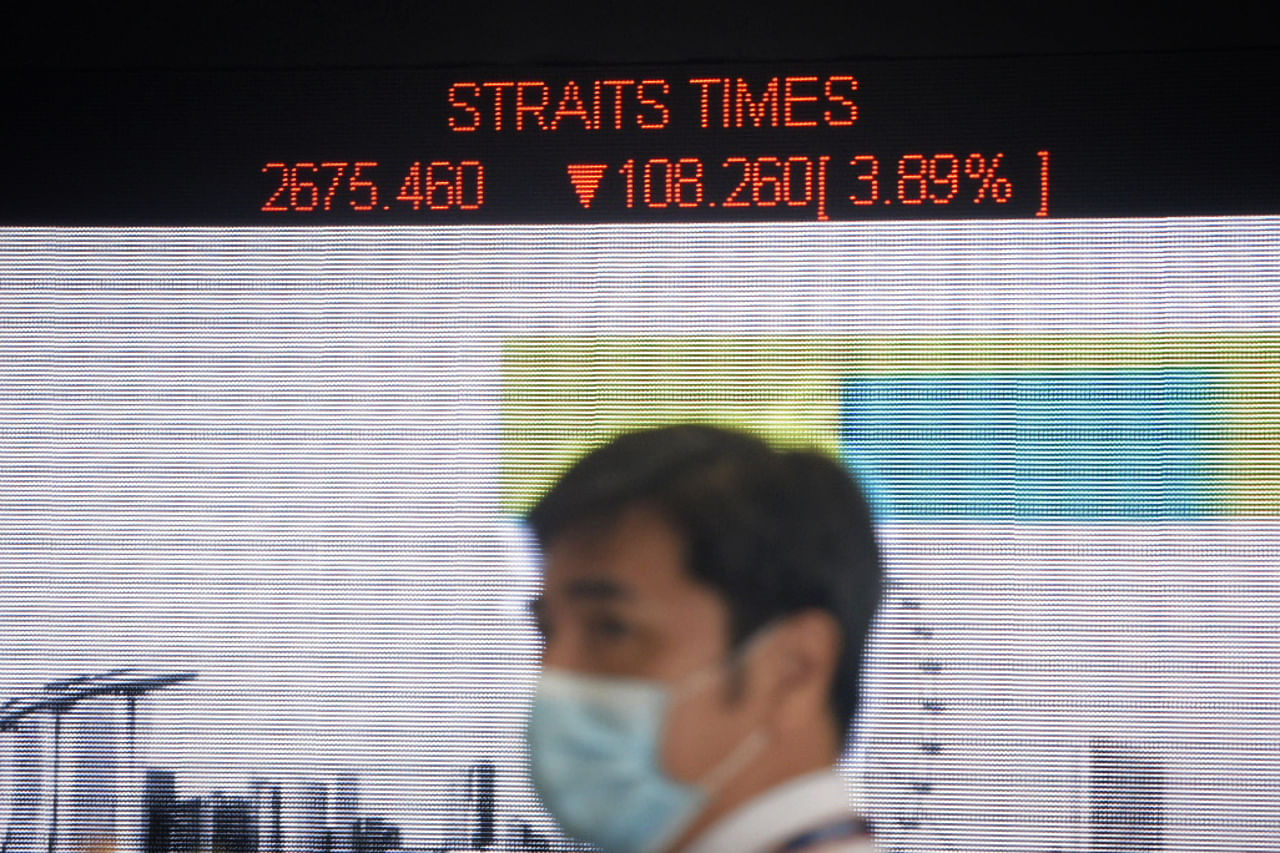'Sell, sell, sell from opening bell': Singapore share index sinks 7.4% in biggest one-day drop since 2008
Sign up now: Get ST's newsletters delivered to your inbox

A security guard donning a mask is seen in front of an electronic stock board showing the Straits Times Index at The SGX Centre on March 12, 2020.
ST PHOTO: MARK CHEONG
Follow topic:
SINGAPORE -It was sell, sell, sell from the opening bell on Monday (March 23), after the number of Covid-19 related deaths jumped over the weekend and a hoped-for $2 trillion US stimulus bill got blocked.
Fears that the coronavirus will damage the global economy significantly and for longer than expected saw the Singapore's Straits Times Index (STI) close down 177.26 points or 7.4 per cent to 2,233.48. This was the biggest one-day drop in the STI since its all-time record 8.3 per cent plunge on Oct 24, 2008, in the midst of the global financial crisis.
Within minutes of opening, the STI sank 7.9 per cent and then slid further, down 8.4 per cent, before paring losses.
At the close, Singapore was among Asia's worst market performers. Some 421 stocks fell while only 95 climbed. Trading volume was below average with some 1.43 billion shares worth $1.81 billion changing hands.
The market rout came as a rising tide of national lockdowns threatens to overwhelm policymakers' frantic efforts to cushion what is likely to be a deep global recession.
India stocks lost 13.4 per cent and Thailand plunged 10.1 per cent while Australia dropped 5.6 per cent. South Korea shed 5.3 per cent, Hong Kong 4.9 per cent and Shanghai 3.1 per cent. The only major Asian market that closed higher was Japan, which rose 2 per cent, helped by expectations of more aggressive asset buying by the Bank of Japan.
Also fuelling the sell-off in Asia was the renewed plunge in oil prices, and a sharp drop in US stock futures outside trading hours on Sunday, pointing to another volatile week for Wall Street and markets globally.
"The market is in despair. Investors here have easily lost 30 per cent off their stock portfolios," Lim & Tan remisier Albert Tye said.
"Everyone is feeling lousy seeing the casualties piling up. Even though China is recovering, there is still fear of imported cases when people start returning to work.
"The global financial crisis was just a financial crisis, and China wasn't affected. Now, it's not only a global financial crisis, the real economy is also hit. People are not producing, spending. That's a different thing. It's real carnage, and how long it will last nobody knows," Mr Tye added.
Adding to fears was news of lockdown measures being imposed across several US states.
Tayrona Financial research director Liu Jinshu noted: "Based on technicals, some traders were optimistic last week that the STI had reached the bottom. But that's off the table now, with no US stimulus bill yet, and New York and Washington state under lockdown, which will have an impact on US economic data going forward. All this means there may be no fast resolution."
According to the latest forecast by IHS Markit, the US economy is expected to shrink by 13 per cent in the second quarter and contract by 1.7 per cent for 2020. This marks a drastic revision down from its previous forecast of a 5.4 per cent contraction in the second quarter.
The rout has also slashed valuations of local stocks like Genting Singapore and many others to levels described as "too cheap to ignore".
Genting Singapore shares closed down 9.5 per cent or 5.5 cents to 52.5 cents.
With the casino operator's Japan integrated resorts project "now a remote scenario, and a recovery in earnings might be more drawn-out than expected, its valuation is simply too cheap to ignore," DBS equity research said.
"Downside from here on should be limited, supported by Genting's highly attractive 7.5-8 per cent dividend yield," it added.
Singapore Airlines' valuations look attractive but the brokerage said it continues to "see volatility ahead, growing pressure on load factors and yields.
"We remain cautious on SIA and would watch out for signs of stabilisation, e.g declining trend of new Covid-19 cases before reviewing our rating," DBS Equity Research said. It downgraded SIA to Hold from Buy.
SIA shares closed down 11 per cent or 66 cents to $5.36.

